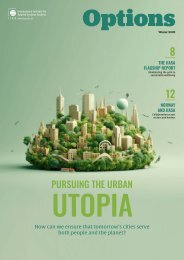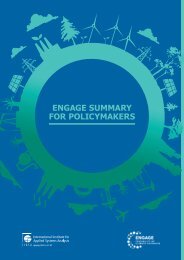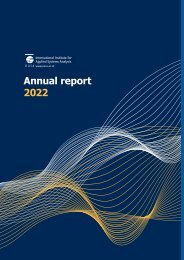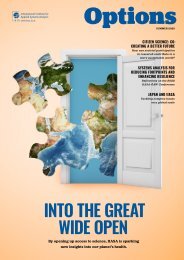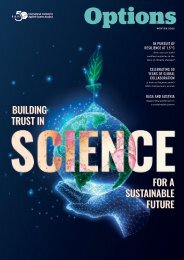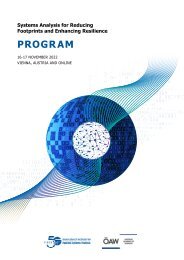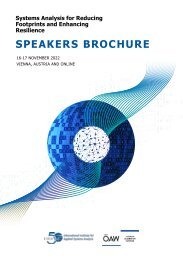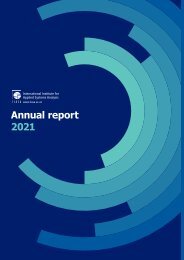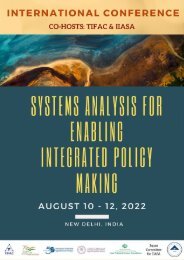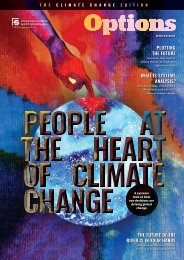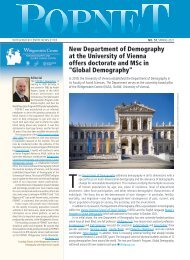Options Magazine, Summer 2022
You also want an ePaper? Increase the reach of your titles
YUMPU automatically turns print PDFs into web optimized ePapers that Google loves.
© Manasthep65 | Dreamstime<br />
Climate Change <strong>2022</strong><br />
Mitigation of Climate Change<br />
WG I<br />
Working Group I contribution to the<br />
Sixth Assessment Report of the<br />
Intergovernmental Panel on Climate Change<br />
By Ansa Heyl<br />
IIASA AND THE IPCC: PROVIDING A SOLID FOUNDATION<br />
FOR THE FIGHT AGAINST CLIMATE CHANGE<br />
Pioneering IIASA research into climate change in<br />
the 1970s and 1980s played a key role in establishing<br />
the Intergovernmental Panel on Climate Change<br />
(IPCC) in 1988. Since then, IIASA scientists have<br />
been authors and reviewers of all IPCC assessment<br />
reports with their participation and input not only<br />
contributing to, but also supporting the scientific<br />
foundation of these reports.<br />
As a multidisciplinary, international research<br />
institute conducting policy-oriented research into<br />
issues that are too large or complex to be solved<br />
by a single country or academic discipline, IIASA is<br />
fertile ground for producing IPCC authors. However,<br />
the institute’s contributions to climate science<br />
stretch back even further.<br />
BREAKING NEW GROUND IN CLIMATE SCIENCE<br />
A key conference held by IIASA under the theme,<br />
“Carbon Dioxide, Climate, and Society” in 1978<br />
culminated in one of the earliest international<br />
assessments of the climate problem, with 40 authors<br />
from 11 countries contributing technical papers.<br />
Many of the issues raised at that seminal 1978<br />
conference have been included in IPCC assessment<br />
reports over the years and are still discussed today.<br />
This includes, among others, the use of alternative,<br />
renewable energy sources such as biomass; carbon<br />
capture and storage; how to reduce the world’s energy<br />
demand—and even uncertainty, which dominated and<br />
still dominates every aspect of climate change from<br />
emission rates, through environmental consequences<br />
to the socioeconomic impacts themselves.<br />
Apart from contributions to these and other critical<br />
climate related topics, IIASA continues to set itself apart<br />
as more than just a participant in IPCC assessments<br />
through innovative research in the climate change<br />
arena. Among these is a flagship publication by<br />
IIASA researchers in Nature Climate Change in 2021,<br />
summarizing the community effort on attainability and<br />
costs of climate targets. This work critically informed<br />
the IPCC Sixth Assessment Report and includes about<br />
40% of all scenarios of the community scenarios<br />
that were assessed. IIASA also organized an IPCC<br />
scenario expert workshop in preparation of the Sixth<br />
Assessment Report with more than 100 experts, and<br />
hosts the Scenario Explorer and databases underlying<br />
the Fifth and Sixth Assessment Reports, as well as the<br />
Special Report on 1.5°C as part of a memorandum<br />
of understanding with the IPCC and the Integrated<br />
Assessment Modeling Consortium.<br />
“One of the main challenges in climate modeling<br />
and scenarios is bridging from science to policy<br />
from the long-term global to the short-term local,<br />
www.iiasa.ac.at <strong>Summer</strong> <strong>2022</strong><br />
<strong>Options</strong><br />
7


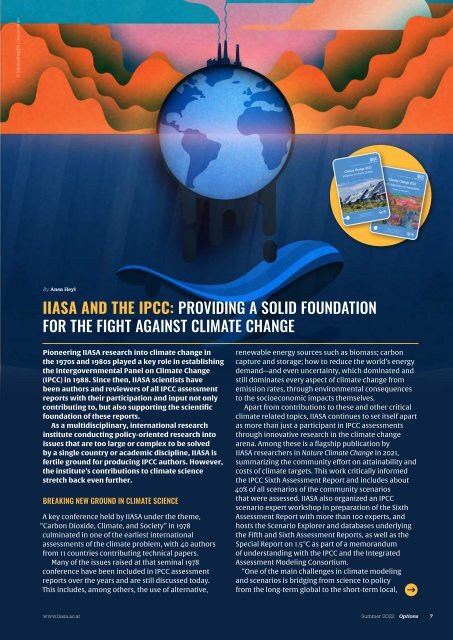

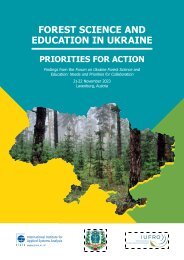
![IIASA BROCHURE_210x594[FINAL] WEB](https://documents.yumpu.com/000/068/591/122/1d4a7749a60d45b83ea15d6d660d0c8b3babc996/30524b562f4966364c7772585a337a5a4b454a3652513d3d/763264657868393835667437685130682f76554f79513d3d.jpg?AWSAccessKeyId=AKIAICNEWSPSEKTJ5M3Q&Expires=1716145200&Signature=Xx6r8IBqCgbIpv5K1R4WDlKP5ys%3D)
